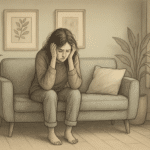Grief is the emotional response to losing someone or something we care deeply about. It is a natural reaction that affects everyone differently. In this article, we will explore the stages of grief and how therapy, specifically grief counseling and grief therapy, can help individuals cope with grief and loss.
Grief and Its Impact
Grief is not just sadness; it is a complex set of emotions that can impact a person’s physical, emotional, and mental well-being. People experience grief in different ways, but the emotions often follow a common pattern called the stages of grief. Understanding these stages can help us better navigate the feelings of loss.
The Grief Cycle: Five Stages
Elisabeth Kübler-Ross first described the stages of mourning in her book On Death and Dying. These phases stand for the typical feelings that people experience following a loss. Although not everyone goes through all of these phases, they offer a useful foundation for comprehending the grieving process.
1. Denial
Denial is often the first reaction to loss. It’s the mind’s way of protecting itself by refusing to accept reality. People may feel numb or in shock during this stage.
2. Anger
After the denial fades, feelings of anger may surface. This anger can be directed at others, the situation, or even the person who has passed away. It is a natural part of the healing process.
3. Bargaining
In this stage, individuals often find themselves thinking of “what if” or “if only” scenarios. They may try to make deals or promises to reverse the loss, even though it’s not possible.
4. Depression
As reality sets in, deep sadness and depression can take hold. Individuals may feel overwhelmed, lonely, or unable to move forward. This stage can last for a while, and professional help like grief therapy can be essential.
5. Acceptance
Acceptance doesn’t mean the individual is “over” the loss. It means they have come to terms with it. The pain may still be present, but they begin to adjust to life without the loved one.
How Grief Counseling Helps?
Grief counseling is a form of therapy that helps people process their feelings after a loss. A trained counselor provides a safe space to talk about the emotions tied to grief, offering tools to cope and move forward.
Understanding Emotions
In grief counseling, individuals learn to understand and process their emotions. The counselor helps them work through the denial, anger, and sadness, guiding them through the stages of grief at their own pace.
Support System
A grief counselor acts as a support system, allowing individuals to express their feelings without judgment. This support is crucial, especially when people feel isolated in their grief.
Customized Coping Strategies
No two people experience grief the same way. A counselor can provide personalized strategies to help individuals cope with grief and loss. Whether it’s through talking, writing, or other forms of expression, the counselor tailors their approach to the individual’s needs.
The Role of Grief Therapy in Healing
Grief therapy goes beyond talking about feelings; it focuses on healing through structured therapeutic methods. These methods can help individuals find meaning and peace in the aftermath of a loss.
Cognitive Behavioral Therapy (CBT)
CBT helps individuals reframe negative thoughts associated with grief. This form of grief therapy is effective in dealing with feelings of guilt, anger, and sadness by changing the way the person thinks about the loss.
Art and Music Therapy
Expressive therapies like art and music can provide a creative outlet for individuals to express feelings they might not be able to put into words. This can be particularly helpful for those who struggle to talk about their emotions.
Group Therapy
Sometimes, being around others who are going through similar experiences can provide comfort. In group therapy sessions, individuals share their stories and listen to others, fostering a sense of community and mutual support.
Coping with Grief and Loss
While grief counseling and grief therapy are vital tools for recovery, there are also everyday strategies individuals can use to cope with grief and loss. These methods aim to provide some relief during difficult times.
Allow Yourself to Grieve
It’s essential to understand that grief is a process that takes time. Allow yourself to feel sad, angry, or even confused. These emotions are natural responses to loss.
Stay Connected
Keeping in touch with friends and family can offer emotional support. Talking to someone who cares can make the grieving process feel less lonely.
Establish a Routine
Sticking to a daily routine can help bring a sense of normalcy to life after a loss. It doesn’t need to be strict, but having a plan for the day can prevent feelings of aimlessness.
Practice Self-care
Taking care of your body can help heal your mind. Simple things like eating well, exercising, and getting enough sleep can make a big difference when coping with grief.
Find Meaning in the Loss
Over time, individuals can work on finding meaning in the loss. This doesn’t mean rationalizing the pain, but rather finding ways to honor the memory of the loved one, such as through rituals or acts of service.
When to Seek Help?
It’s important to remember that grief can take time, but there are moments when professional help is necessary. If someone finds themselves unable to function in daily life, or if the grief feels overwhelming for an extended period, it might be time to seek out grief counseling or grief therapy. Professional guidance can make a significant difference in how one navigates through the stages of grief.
Conclusion
The stages of grief can be a challenging journey, but understanding them can help individuals feel less alone in their experience. With the support of grief counseling and grief therapy, individuals can navigate these stages in a healthy way. These therapeutic methods offer the tools and support needed to process the pain and eventually find acceptance.If you or someone you know is struggling with grief, consider reaching out for support through counseling or therapy. For more resources, visit Mental Health Resources.










